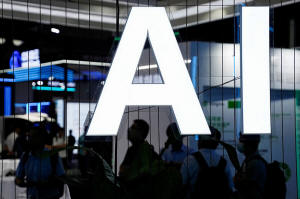|
It
will also step up efforts in big data and artificial
intelligence (AI) and intends to launch a number of major
science and technology programs to meet major strategic and
industrial development goals, the report shows.
"We will fully leverage the strengths of the new system for
mobilizing resources nationwide to raise China's capacity for
innovation across the board." it said.
Beijing has in recent years made technological self sufficiency
a priority, hit hard by trade tensions with the United States
which has restricted exports of chips and some other components
to China.
It has said it wants to improve national security and economic
resilience by nurturing domestic innovation capabilities and
lessening dependence on foreign suppliers, and has increasingly
emphasized the role of the government in directing resources to
help achieve this goal.
This year's emphasis on emerging technologies like AI is not
surprising, said Alfredo Montufar-Helu, Beijing-based head of
the China Center at the Conference Board.
It is in line with last year’s Central Economic Work Conference,
where building self-reliance and strength in technology and
improving the resilience and security level of supply chains
were identified as top priorities for the government’s work in
2024 and beyond, he added.
Since last year, the ruling Communist party has been granted
more power in making tech-related policies, part of a bigger
government restructuring.
China established a new technology commission under the
Communist party's control, making the ministry of science and
technology subordinate to the commission, effectively
transferring some of the ministry's previous duties.
"I think the government views this centralization as lowering
coordination costs and increasing the efficacy of targeting key
tech development." said Doug Fuller, a researcher with
Copenhagen Business School.
"However, the flow of necessary information to enact effective
policies might dwindle with centralization and thus will
probably exacerbate the existing problem of information
asymmetries between central ministries and other actors."
China will also nurture more first-class scientists and
innovation teams and improve mechanisms for identifying and
nurturing top-tier innovators, the report said.
(Reporting by Beijing Newsroom and Shanghai Newsroom; Editing by
Christopher Cushing, Edwina Gibbs and Alexander Smith)
[© 2024 Thomson Reuters. All rights
reserved.]
This material may not be published,
broadcast, rewritten or redistributed.
Thompson Reuters is solely responsible for this content.

|
|




